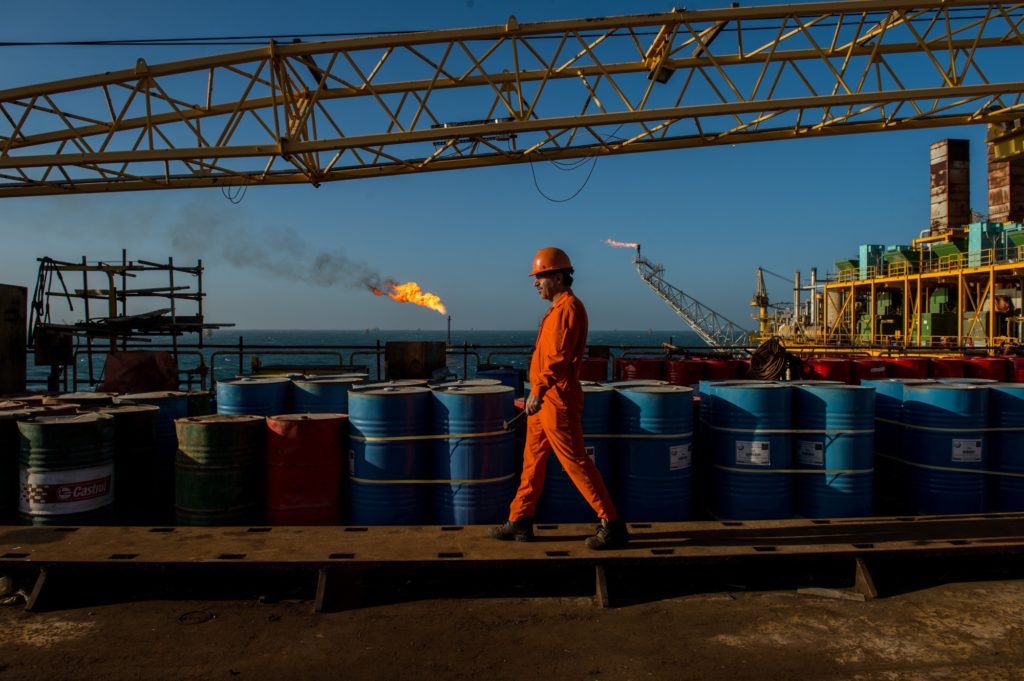
Oil was jolted higher by efforts across the globe to support prices as Saudi Arabia and Russia extended their pact to manage the market and Canada’s largest producing province ordered unprecedented output curbs. Prices retreated slightly after Qatar said it was leaving OPEC.
After their worst month in a decade, futures in New York and London advanced more than 5 percent on Monday. Although Moscow and Riyadh have yet to confirm any fresh cuts, the agreement by the Russian and Saudi leaders over the weekend opens the door for a deal at the OPEC meeting this week in Vienna. Alberta’s decision to curtail production by 325,000 barrels a day put a rocket under oil’s rally before Qatar’s surprise announcement that it was leaving the producer group to focus on gas.
Bullish investors are taking heart that the world’s biggest producers are ready to take action after crude collapsed into a bear market on fears of a glut. Speculation over whether the Organisation of Petroleum Exporting Countries and its partners will curb output has gripped the market in recent weeks, causing volatility to spike. While OPEC delegates said the Saudi and Russian leaders have given political blessing for an agreement, questions remain, including the size of any potential cut.
“We may see prices recovering to $60 a barrel this month and depending on how much and until when OPEC’s output curbs will continue, we might be heading toward $70,” Sungchil Will Yun, Seoul-based commodity analyst at HI Investment & Futures, said by phone. “Canada’s production cuts are adding to the bullish sentiment in the oil market, removing concerns of oversupply that has so far been dampening prices.”
West Texas Intermediate for January delivery climbed as much as $2.92, or 5.7 percent, to $53.85 a barrel on the New York Mercantile Exchange, its biggest intraday gain since June. The contract traded at $53.51 at 3:37 p.m. in Seoul, after losing 22 percent last month. Total volume traded was more than triple the 100-day average.
Brent for February settlement rose as much as 5.3 percent to $62.60 a barrel on London’s ICE Futures Europe exchange. The global benchmark crude was at an $8.59 premium to WTI for the same month. The January contract expired on Friday after declining 1.3 percent.
OPEC’s President and the United Arab Emirates Energy Minister Suhail Al Mazrouei, said he was optimistic OPEC+ will reach an agreement in Vienna over a cut in production for 2019. Technical teams are working on the level of the cuts necessary and the reference baseline for the reduction, he said.
Alberta’s unprecedented curbs, announced Sunday, are an effort to ease a crisis in the nation’s energy industry. The province will reduce production of raw crude and bitumen by 8.7 percent starting in January until the levels of excess oil in storage are drawn down. The reduction would then drop to 95,000 barrels a day until the end of next year at the latest.
The amount being cut is more than the total production of each of OPEC’s three smallest members: Equatorial Guinea, Gabon and the Republic of Congo.
“It’s always more impactful when everyone joins the fray,” said Stephen Innes, head of Asia Pacific trading at Oanda Corp. “It definitely highlights just how critical a supply cut at this juncture is needed to stop oil prices for plummeting. It’s a bullish set up all around.”
Alberta’s producers have been particularly battered by crude’s slump amid surging oil-sands output, a shortage of pipeline space and heavy U.S. refinery maintenance. The province is following the advice of companies like Cenovus Energy Inc. and Canadian Natural Resources Ltd., which have been hammered by record low prices for heavy Canadian crude that at one point were $50 a barrel less than U.S. grades.
Meanwhile, Qatar’s energy minister said the country, which accounted for less than 2 percent of OPEC’s production in October, would leave from January and thereafter would not be committed to any agreements by the group.
Prices got a further boost as Donald Trump and his Chinese counterpart Xi Jinping called a truce in their trade dispute, with the U.S. president agreeing to postpone a planned tariff hike on Chinese goods for three months in return for greater purchases of American products. The pact prompted a rally in riskier assets, including oil, as fears over the economic fallout of the trade war ease.
Other oil-market news: Money managers cut total positions on WTI crude to the lowest level in five years, according to U.S. data released Friday. Oil explorers expanded drilling in American fields as OPEC and allied crude exporters prepared to discuss production controls and cratering prices.